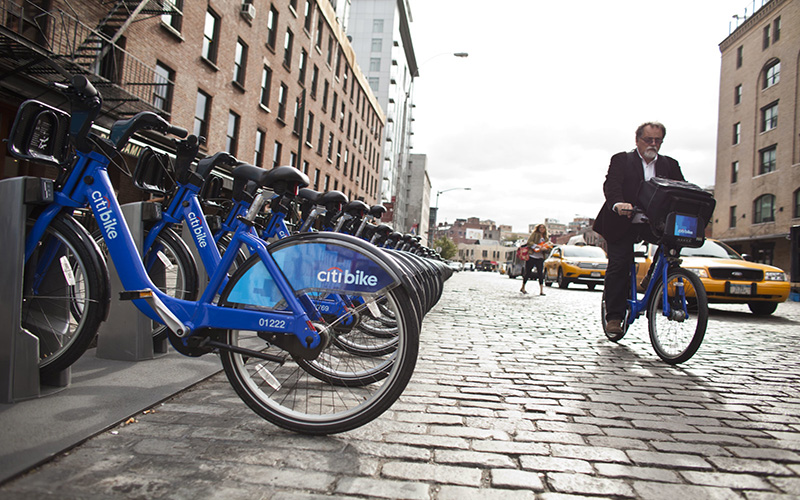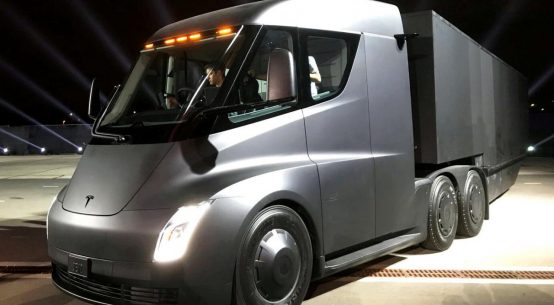
New York, NY – October 9, 2013: A man rides out a Citibike from a bike-sharing station in the Chelsea section of New York City. Citibike launched during the summer has proven to be a huge success. (Photo by Ramin Talaie/Corbis via Getty Images)
- Lyft might not sit idle while Uber leaps into the bike sharing space.
- It could give Lyft an advantage over Uber in the two-wheel wars.
Lyft might not sit idle while Uber leaps into the bike sharing space. The Information sources have claimed that Lyft is close to acquiring Motivate, the bike sharing behemoth responsible for New York City’s Citi Bikes and San Francisco’s Ford GoBikes.
Neither company has agreed to comment on the move or how it would affect service, but it supposedly wouldn’t affect Motivate’s existing agreements.
If a buyout moved forward, it’d represent a coup for Lyft. Jump was only available in San Francisco when Uber stepped in this April, but Motivate has exclusive deals in NYC, San Francisco and Boston as well as a preferential arrangement in Chicago and Washington, DC.
That could help Lyft quickly integrate bikes into its transportation network – as in Baltimore, you could start and stop journeys at bike docks to both save money and the environment. Uber isn’t necessarily shut out, but it’d have to develop its own services in areas where Lyft would have a head start.
However this might shake out, it would reflect an increasing shift away from purely car-based services among ridesharing companies. They’re diversifying in hopes of both cornering additional markets and protecting themselves in the event cars fall out of favor.
Lyft Wants to Dominate Transportation, and That Means Bike Share
HARK, THE AGE of the non-car form of transportation has dawned. On Friday, The Information reported that ride-hailing giant Lyft is nearing a deal to acquire Motivate, the largest bike-share program operator in the United States, for $250 million.
If finalized, the transaction would give Lyft, currently valued at $11 billion and running cars in more than 400 cities around the US, an even heftier role to play in a changing urban transit landscape. A Lyft spokesperson declined to comment on the report. Motivate did not respond to a request for comment.

Yes, the race to control every part of the urban transportation system is on. And thanks to the rising popularity of bike- and scooter-shares, the game ain’t just about cars anymore. That makes Motivate an important player.
The company’s eight bike-share programs—including the country’s largest, New York’s CitiBike, its oldest, DC’s Capital Bikeshare, plus Chicago’s Divvy, San Francisco’s FordGoBike, and Boston’s Hubway—account for at least three-quarters of last year’s 35 million bike-share trips. That number is up a whopping 25 percent since 2016.
Then there are the big-money dockless bike-share upstarts, like Jump, Lime, and Ofo. (Motivate has mulled its own dockless bike service.) And now, shared electric scooters.
In the past three months, Los Angeles-based startup Bird has dropped into San Francisco, Austin, Nashville, and Charlotte, North Carolina. Now, it’s reportedly raising a $150 million funding round and is valued at a unicorn-y $1 billion. Lime, Spin, Skip, and newcomer GOAT (do not ask) have joined the scooting fray. Lyft, too, is exploring its own scooter service, at least in San Francisco.
Scooping up Motivate would also put Lyft in direct competition with an old pal: Uber. Under the leadership of new CEO Dara Khosrowshahi, the $62 billion company acquired Brooklyn-based bike-share company Jump for $200 million in April. Uber has announced partnerships with mobile-ticketing company Masabi and car-share platform Getaround, allowing riders in select markets to purchase public transit tickets, car rentals, and bike rides through its app.
Even if this line of business doesn’t turn out to be part of a big, fantastical mobility bubble, it comes fraught with logistical and operational challenges. How do you keep your devices clean, working, and in the right places when people need them? These are new challenges for Lyft, which doesn’t own Lyft drivers’ cars, but would own and operate Motivate’s bikes.
(Motivate tends to employ rebalancers, who drive about in vans or pedal-powered haulers, moving bikes to where riders will find them most convenient. The new upstarts like Bird rely on gig economy workers, who charge, move, and sometimes even repair bikes and scooters for $5 to $25 per device in nightly fees.)
Lyft and Uber have good reason to expand beyond the car business: Alternatives might be cutting into their business. According to the National Association for City Transportation Officials, regular users ride about 12 minutes per trip, covering about a mile and a half.
Bird and Lime report similar numbers for their scooters. These are distances that are annoying to walk but don’t make a lot of economic sense in an Uber or Lyft, which can cost closer to $15 for the same trip during rush hour. Bikes and scooters threaten to cut into the short-trip market for ride-hail. So why not buy a slice of the market when you can?
One more challenge for these mobility companies: local politicians. Cities felt burned by the rise of grey-area exploiters and rule-breakers—like, ahem, Uber and Lyft, which marauded their way into local markets just a few years ago.
To avoid getting caught flat-footed again, city officials have set about making detailed deals and writing purposeful regulations before the new forms of transport find too many users. Chicago, Austin, and San Francisco are all considering initial regulations that would cap the number of dockless bikes and scooters within their borders. Some require new devices to lock to infrastructure, like bike racks—even though many companies use vehicles that don’t come with locks.
In this, Lyft may have just bought itself a bit of an advantage. As other companies hack their way through city halls, Motivate enjoys exclusive bike-share contracts with a bunch of biggies, including New York, San Francisco, and Boston.
The Information reports that Motivate doesn’t believe the Lyft acquisition would affect these contracts. (That exclusivity, though, is under threat: New York will experiment with dockless bike-share in parts of the city outside its Motivate contract. After legal arbitration, Motivate reached a compromise with San Francisco to allow a limited number of Jump Bikes to begin operating in the city last January, as part of an 18-month pilot program.)
If the deal goes through, Lyft will have plenty to figure out. But if it can crack the logistics, it’ll be more than a ride-sharing company. It’ll be a transportation company, in the most modern, wonderfully newfangled sense of the word.
From 4 wheels to 2 wheels — Lyft looks to add CitiBike to its fleet
It’s no longer enough to simply dominate the highways. Ride-sharing companies are now looking to expand their domain to bike lanes and sidewalks as well That’s being evidenced by Lyft, the San Francisco-based transportation giant that is reportedly close to closing a deal to acquire Motivate, the company behind the hit bike-sharing program Citibike. It is the largest bike-share program in the U.S., and according to The Information, this deal would cost Lyft about $250 million.
In recent weeks and months, a growing number of transportation companies have emerged that utilize not automobiles, but rather two-wheeled vehicles in order to move people from Point A to Point B. Not only are companies like LimeBike gaining in popularity, but other companies like Bird are beginning to capitalize on even more innovative forms of transportation like electric scooters. In fact, not so long ago, Lyft jumped on the e-scooter bandwagon by launching its own pilot program in San Francisco.
But while these scooters may be the trendier option these days, bike-sharing is already a well-established system, especially as far as Motivate is confirmed. The company is behind New York City’s perennially popular CitiBike, Washington D.C.’s Capital Bikeshare, Chicago’s Divvy, San Francisco’s FordGoBike, and Boston’s Hubway. In total, Motivate was responsible for at least 75 percent of the 35 million bike-share trips taken in 2017. That’s a 25 percent increase over 2016 data.
Needless to say, this is a booming market and one that Lyft seems eager to get into. After all, its biggest competitor, Uber, has recently made a similar acquisition of its own. Just a couple months ago, Uber purchased Jump, a Brooklyn-based bike-sharing company, for about $200 million.

Unlike CitiBike and other Motivate-run programs, Jump operates a dockless system, which offers commuters a bit more flexibility in terms of pick-up and drop-off locations. It’s significantly smaller than Motivate in terms of total bikes and total number of users, however, which could be an enormous boon to Lyft should the deal ultimately go through.
Though The Information reports that both Lyft and Motivate have agreed on the terms of the deal, it has yet to be finalized. We’ll be sure to keep you posted on the latest developments.
- The articles originally appeared on Engadget.









